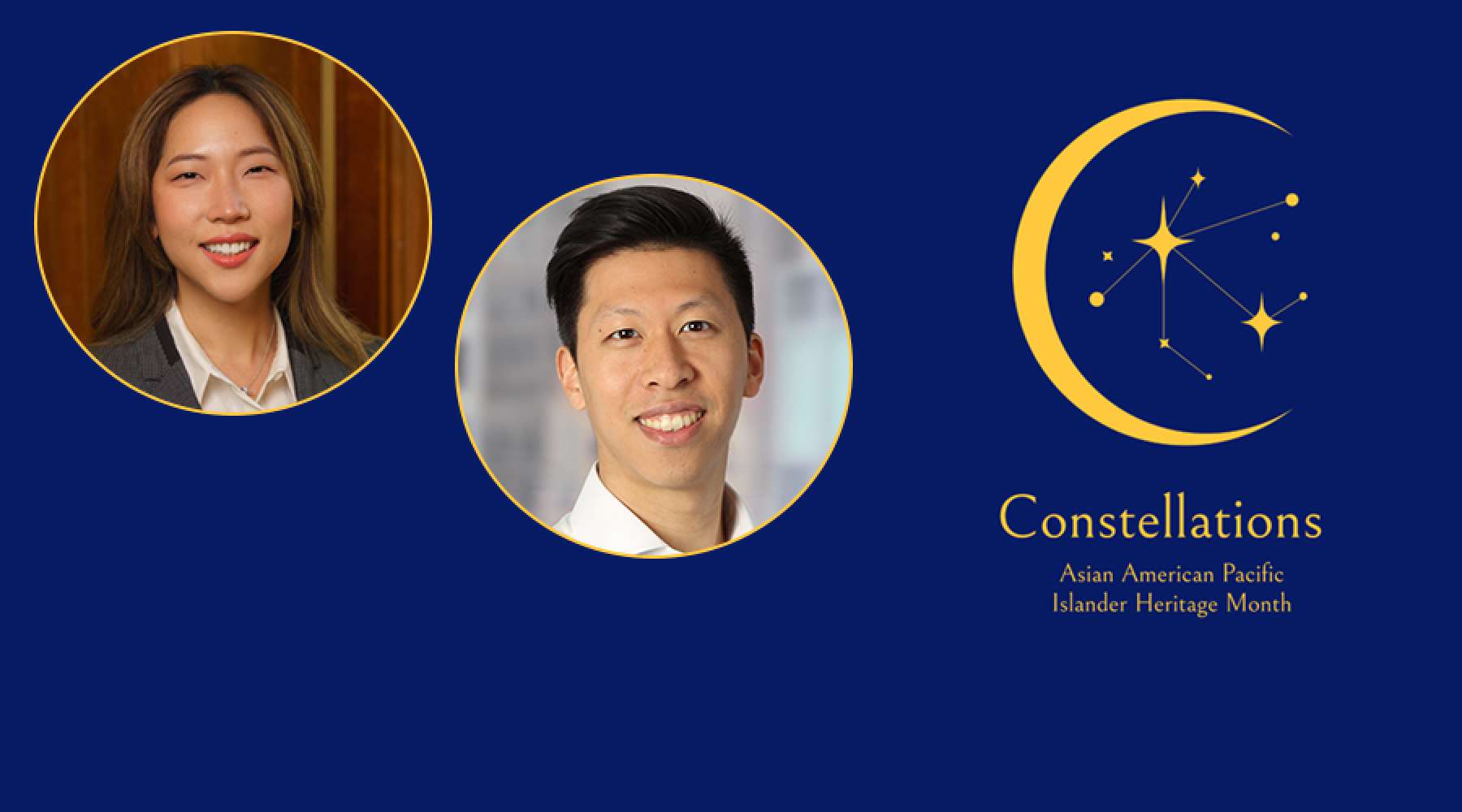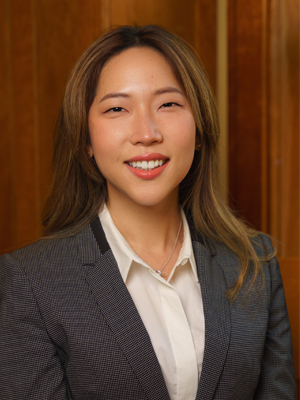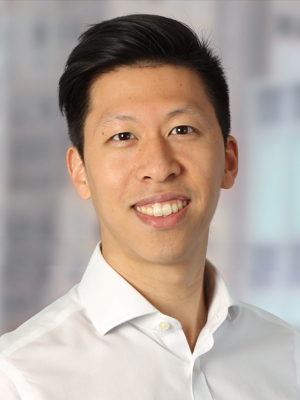
Throughout the month of May, the Tuck and Dartmouth communities will offer a number of events and programs to celebrate Asian American Pacific Islander Heritage Month. AAPIHM 2022’s theme, Constellations, explores the ways in which each member of the AAPI community creates connections with each other and with other marginalized communities. Each constellation represents the solidarities formed across time and space, symbolizing transnational and transcultural strength.
In celebration of AAPIHM, we asked members of our AAPI community to reflect on their goals, accomplishments, inspirations, and passions.

What accomplishment are you most proud of?
I came to Tuck knowing the next two years would be transformative. The experience I am most proud of so far is speaking at TuckTalks this past November. I had watched TuckTalks virtually before I came to school and was impressed by the emotional depth and expressiveness that past speakers demonstrated. I was looking forward to that same emotional openness among my classmates when I first stepped onto campus. But with the frenzy of nearly 300 unique individuals meeting each other for the first time, I couldn’t immediately find that same sense of vulnerability that the TuckTalks speakers exhibited. After thinking through what it would look like for me to speak in a room full of my new classmates, all virtual strangers, I decided to bite the bullet and share my story.
I spent a month crafting my story alongside the other TuckTalks coaches and speakers. The journey was nerve-wracking as I would laugh at shared jokes among classmates, power through cases for classes, then return to my room to dig through my memory for the moments that elated and dismayed, to trick my senses into remembering what they were feeling in the rooms where those moments happened. And to go through this roller coaster of emotions as I was still getting to know everyone, I worried about what everyone would think of me after they heard my story. What if they thought I was weak? What if they thought I didn't belong? With these inner voices in the background, I finished the final draft of my talk and took the podium.
I used to believe that my story made me so different from everyone else, especially those that are privileged to attend prestigious institutions like ours. I thought that being a low-income first-generation college student from a Korean immigrant family meant it would be harder for me to find people here who spoke like me, who shared my sense of humor, who felt the same pangs of duty and familial pride. Speaking at TuckTalks taught me that our stories unite us regardless of age, race, gender, or family background. Classmates whom I had never talked to before, who shared completely different backgrounds from me, came and found me for weeks after I gave my talk to share that my story resonated with them. Though we may not all show it openly, we each have stories that brought us here to Tuck and that shaped us to be the kind, bright, and thoughtful leaders we are today.
Because of what I learned through my experience, I decided to become a co-chair of TuckTalks. I'm excited for all the new stories to come.
What keeps you busy? How do you like to spend your time outside of school?
What keeps me busy is my side hustle as an influencer! I started creating Instagram content during the pandemic to document my skincare journey, and now beauty brands reach out to me to create ads for them. My Instagram gives me a creative outlet that lets me zone out from all the stresses of recruiting and school assignments. It's crazy to think about monetizing a passion, but I just signed a manager to help organize my brand deals and I'm suuuuuper excited to keep creating fun content.
What have you recently, read, watched, or listened to that you enjoyed and would highly recommend to others?
I've been listening to this new podcast called Feeling Asian that's hosted by two Korean American comedians. Their conversations are always hilarious, but they also get deep into talking about issues that are familiar to kids who grew up in the US as children of immigrants. It's a common inside joke among Asian Americans that we had to grow up holding in our emotions, so a podcast dedicated to sharing our feelings openly is cathartic. They recently interviewed Lisa Ling and it was amazing to hear her get so real about imposter syndrome when she is so celebrated in the journalism industry.
Hanah Bae is a first-year student at Tuck and a Korean American from Chicago. Prior to business school, she worked in the healthcare industry for six years (three years as a researcher in clinical research, three years as a consultant in healthcare consulting). She graduated with a BA in Liberal Arts from Cairn University and an MSEd in Mental Health and Counseling from the University of Pennsylvania.

What does diversity, equity, and inclusion mean for you today, and in your words, why is it so critical?
To me, diversity, equity, and inclusion is about bringing people together to embrace our differences and enrich one another. It's critical because of how it expands our perspectives, reveals our biases, increases our empathy, and challenges us to grow. It's also hard. I think most humans naturally want to fit in and therefore feel pressure to conform, increasingly so as environments become homogeneous. I felt this growing up in a town that was 99% white. I desperately wanted to fit in, and the way to fit in was to hide my Asianness as much as possible, which affected my personal identity but also perpetuated the groupthink that was already in place.
How would you describe your life philosophy? What do you believe are the components of a “good” life?
As a dedicated Christian, my life philosophy is to love God and to love others (but to be clear, I'm not particularly good at either). I've found that love, which actually demands great sacrifice, brings me lasting fulfillment while most other pursuits in life simply leave me wanting more.
In your opinion, what makes a good leader?
A good leader combines conviction with humility and helps others become the best versions of themselves by inspiring, empowering, and investing in them.
What’s something about you only a few people know?
I didn't speak English when I started attending school as my parents spoke exclusively Mandarin at home. As I began learning English, I developed a lisp which was unfortunately pointed out to me by other kids. I was too embarrassed to ask for help, so I experimented with different fixes and eventually corrected it myself over many years. I'm not actually sure if it's 100% correct today, so I get the occasional fear that it's still lingering in my speech somewhere.
Josh Feng is a vice president of product management and global lead of the Consumer Engagement practice at Mastercard. In this role, he is responsible for growing and shaping the direction of the Consumer Engagement practice, which brings together services, technology, and proprietary data to help other organizations build deeper customer relationships. Josh joined Mastercard through its acquisition of SessionM, a Boston-based martech startup, where he formed and led the strategy and analytics team. Previously, he was a consultant at McKinsey & Co. and worked in M&A at a boutique investment bank. Josh received a B.S. in Finance from Pepperdine University and an MBA from the Tuck School of Business at Dartmouth.
Many Voices, One Tuck celebrates the stories of our vibrant and diverse community. What's your story? Email DEI at Tuck if you'd like to contribute to the MVOT project.
Note: MVOT is open to members of the Tuck community, including students, alumni, faculty, staff, TEE and Tuck Bridge participants, and MHCDS graduates.